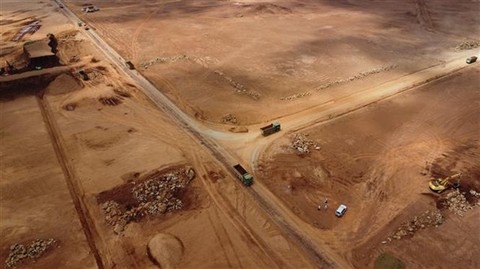
Containers at Cái Mép-Thị Vải port. The port is a factor that helps Bà Rịa-Vũng Tàu province attract FDI. — VNA/VNS Photo
Bà Rịa-Vũng Tàu and Đồng Nai provinces have become magnets for foreign direct investment (FDI) in the southeastern region.
According to the Vietnam Foreign Investment Agency under the Ministry of Planning and Investment, Bà Rịa-Vũng Tàu Province topped the country in FDI attraction with newly registered FDI of more than US$1.52 billion in the first four months of this year, accounting for 16.4 per cent of the country's total FDI capital, more than 12 times higher than the same period last year.
The provincial Party Committee Secretary Phạm Việt Thanh highlighted local advantages, saying that the province has a particularly important strategic position, and is a gateway to the East Sea of the southeast region and the whole country, along with favourable natural conditions, hospitable people, and a quality workforce.
Under its development master plan by 2030, Bà Rịa-Vũng Tàu will have 24 industrial parks with an area of 16,052 ha. In addition to 13 operating industrial parks, the Long Sơn Oil and Gas Industrial Park has been granted an investment registration certificate while two industrial parks are undergoing investment procedures, and seven others have been added to the planning.
Matsumoto Nobuyuki, chief representative of the Japan External Trade Organisation (JETRO) in HCM City, said that Bà Rịa-Vũng Tàu is one of the localities that JETRO has advised businesses to invest in.
According to him, the province habours advantages such as Cái Mép Thị Vải port, Long Thành international airport which is under construction, oil and gas resources and LNG warehouses, plus a stable electricity supply source.
It is next to Đồng Nai and Bình Dương – two localities with factories ensuring sufficient supply for production.
Meanwhile, Đồng Nai province has been considered a "magnet" to attract investors, especially global leading companies and corporations for many years, as a series of transportation infrastructure projects have been invested and will be put into operation in the next few years such as Long Thành international airport, Biên Hòa - Vũng Tàu expressway, and HCM City Ring Road 3.
According to Director of the provincial Department of Planning and Investment Nguyễn Hữu Nguyên, Đồng Nai is focusing on developing high-tech industry, trade, and logistics.

Long Thành international airport under construction in Đồng Nai Province. — VNA/VNS Photo
It offers incentives and support policies for investors in the fields of supporting industries, high technology, and others.
Besides, Đồng Nai is paying attention to environmental issues and high-quality workforce.
Chairman of the Bà Rịa-Vũng Tàu provincial People's Committee Nguyễn Văn Thọ said apart from promoting its advantages, the province pays attention to addressing bottlenecks in the mechanism, reviewing and simplifying administrative procedures so as to create favourable conditions for businesses.
Bà Rịa-Vũng Tàu strives to develop an economic axis linked to Cái Mép-Thị Vải seaport, the inter-port transportation system and National Highway 51.
Moreover, the Biên Hòa-Vũng Tàu expressway and HCM City Ring Road 4 will form a dynamic economic axis of industry-logistics.
The province also strives to develop large-scale industrial-service-urban complexes in the new city of Phú Mỹ.
In addition to two industrial parks in Vũng Tàu City and Đất Đỏ district, the province's entire area for industrial park development will be located in Phú Mỹ and Châu Đức districts.
Industrial parks in this driving force axis attract selective investment in industries with high and advanced technology such as electricity - electronics, robot production, integrated automatic operation and remote control equipment, Internet of Things (IoT), artificial intelligence, production of means of transport, pharmaceuticals, and biological products.
Secretary of the Đồng Nai provincial Party Committee Nguyễn Hồng Lĩnh said that entering a new stage of development, the province requires FDI enterprises to use modern technology and apply digital transformation.
The province targets to be one of the country's important growth poles by 2050, leading the nation in developing high-value industries, with focus on green economy and circular economy to reach the goal of carbon neutrality by 2050. Up to 65 countries and territories have registered to invest in Bình Dương.
To seize new opportunities, especially after Việt Nam upgraded its partnership with a series of large economies such as the US, Japan, the Republic of Korea, China, and Australia, Bình Dương province has been proactive to come those countries to call for investment. — VNS